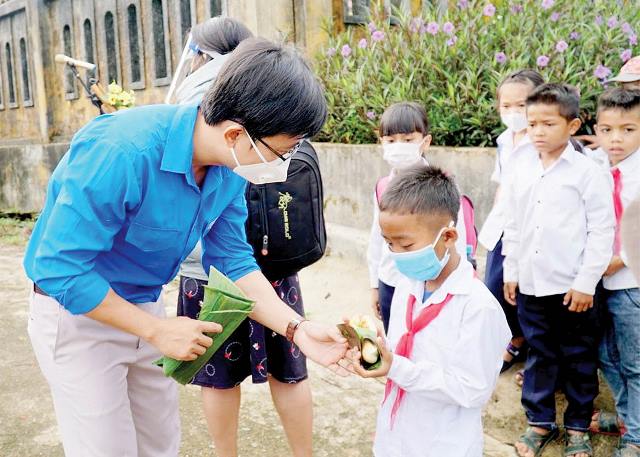
Youth union members in A Luoi use banana leaves to wrap and give sticky rice and bread to students
About 6:30 a.m., Le Van Song (a student of A Dot Primary School) brought a bunch of banana leaves to meet the brothers and sisters in Lam Dot Commune to exchange for sticky rice. The fragrant and hot cassava sticky rice wrapped in banana leaves is both environmentally friendly and makes many students excited.
Song said: "I think the program is very good, we have both been given sticky rice to eat before going to school, and at the same time, we can do meaningful things like the lessons that teachers have taught in class."
The model of exchanging leaves for sticky rice is gradually becoming familiar to many poor students and disadvantaged people in Lam Dot commune. From the activity launched by the A Luoi District Youth Union on September 9, this model has also spread positive things.
“The main source of funding for the program is from union members and sponsors inside and outside the district. Banana leaves and dong (phrynium) leaves are used to pack sticky rice instead of plastic boxes and bags to protect the environment. In the long run, the source of leaves is urgently needed, so we devised a model of exchanging leaves for sticky rice, taking advantage of the leaves of the growers, thereby also propagating the awareness of environmental protection, especially educating the awareness of environmental protection for children," said Mr. Tran Toan, Secretary of A Luoi District Union.
Every day, members of Lam Dot Commune Union assign each other to prepare ingredients from the previous evening, then early the next morning, there are union members who get up early to be in charge of cooking sticky rice.
Mr. Tran Van Hung, Secretary of Lam Dot Commune Union, said that he cooks about 10 cans of sticky rice every day, with about 50 servings of sticky rice next to the ‘zero dong’ bread cabinet to support breakfast for poor students and disadvantaged people across the locality. In addition to cassava sticky rice, the Union also cooks bean sticky rice to have more choices for people who receive free breakfast.
People who are given sticky rice are not required to exchange leaves, but the spirit of exchanging leaves for sticky rice is strongly propagated, with the message aiming to say no to plastic bags that are released into the environment, and switch to using other types of leaves for packaging, focusing on environmental friendliness and contributing to environmental protection.
Stories related to the "fight" against plastic waste were also passed on by students and people after listening to the talks of the union members.
The story from the point of giving away sticky rice was also brought into the classroom. According to the teachers of A Dot Primary School, many students of the school with difficult circumstances receive breakfast from this model. Real people, real things, so school teachers often use the model of exchanging leaves for sticky rice to instruct, remind students and share necessary messages about environmental protection awareness, minimizing and moving towards saying no to the use of plastic bags.
Mr. Hung said that at first, few people brought leaves to exchange sticky rice, but when he saw that some students and people in the area did, gradually this model is being made a habit for those who come later.
“Banana leaves are not difficult to find because many families in the highlands grow around their houses. Unexpectedly, taking advantage of banana leaves and not using plastic packaging has such a good effect," shared Mr. Ho Van Bac, a resident of Lam Dot commune.
According to the leader of A Luoi District Youth Union, from the meaningful model in Lam Dot commune, the Youth Union will research to replicate it in some other localities to both support breakfast for poor students and people in difficult circumstances and promote environmental awareness.
Story and photo: Minh Tam